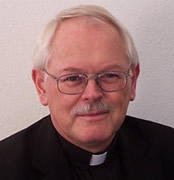St. Eugene de Mazenod, the founder of the Missionary Oblates of Mary Immaculate, the religious congregation to which I belong, left us with these last words as he lay dying: “Among yourselves, charity, charity, charity.” I don’t always live that, though I wish I could, especially today.

We are in a bitter time. Everywhere there is anger, condemnation of others and bitter disagreement; so much so that today we are simply unable to have a reasonable discussion on any sensitive political, moral or doctrinal issue. We demonize each other to the point where any attempt to actually reason with each other (let alone to reach agreement or compromise) mostly just deepens the hostility. If you doubt this, simply watch the newscasts any evening, read any newspaper, or follow the discussion on most moral and religious questions.
The first thing that is evident is the naked hatred inside our energy and how we tend to justify it on moral and religious grounds. This is our protest: “We’re fighting for truth, decency, justice, God, family, church, right dogma, right practice, for Christ himself, so our anger and hatred are justified.” Anger is justified, but hatred is an infallible sign that we are acting in a manner contrary to truth, decency, justice, God, family, church, right dogma, right practice and Christ. It would be hard to argue that this kind of energy issues forth from God’s spirit and does not source itself elsewhere.
Looking at Jesus we see that all his energies were directed towards unity. Jesus never preached hatred, as is clear from the Sermon on the Mount, as is illustrated in his great priestly prayer for unity in John’s Gospel, and as is evident in his frequent warnings to us to be patient with each other, to not judge each other and to forgive each other.
But one might object: what about Jesus’ own (seemingly) bitter judgments? What about him speaking harshly of others? What about him losing his temper and using whips to drive the money-changers out of the temple? Indeed, what about his statement: “I have come to bring fire to this earth?”
These statements are perennially misinterpreted and used falsely to rationalize our lack of genuine Christian love. When Jesus says that he has come to bring fire to this earth and wishes it were already blazing, the fire he is referring to is not the fire of division but the fire of love.
Jesus made a vow of love, not of alienation. His message provoked hateful opposition, but he did not self-define as a cultural or ecclesial warrior. He preached and incarnated only love, and that sometimes sparked its antithesis. (It still does.) He sometimes triggered hatred in people, but he never hated in return. Instead, he wept in empathy, understanding that sometimes the message of love and inclusivity triggers hatred inside of those who for whatever reason at that time cannot fully bear the word love.
As well, the incident of him driving the money-changers out of the temple, forever falsely cited to justify our anger and judgment of others, has a very different emphasis and meaning. His action as he cleanses the temple of the people who were (legitimately) exchanging Jewish currency for foreign money in order let foreigners buy what they needed to offer sacrifice, has to do with him clearing away an obstacle in the way of universal access to God, not with anger at some particular people.
We frequently ignore the Gospel. Factionalism, tribalism, racism, economic self-interest, historical difference, historical privilege and fear perennially cause bitter polarization and trigger a hatred that eats away at the very fabric of community; and that hatred perennially justifies itself by appealing to some high moral or religious ground.
But the Gospel never allows for that. It never lets us bracket charity and it refuses us permission to justify our bitterness on moral and religious grounds. It calls us to a love, an empathy and a forgiveness that reach across every divide so as to wish good and do good precisely to those who hate us. And it categorically forbids rationalizing hatred in its name or in the name of truth, justice, or right dogma.
The late Michael J. Buckley, looking at the bitter polarization in our churches, suggests that nothing justifies our current bitterness: “The sad fact stands, however, that it is frequently no great trick to get religious men and women to turn on one another in some terrible form of condemnation. Wars, even personal wars, are terrible realities, and the most horrible of these are often self-righteously religious. For deceived or split off under the guise of good, under the rubrics of orthodoxy or liberality, of community or of personal freedom, even of holiness itself, factions of men and women can slowly disintegrate into pettiness or cynicism or hostility or bitterness. In this way the Christian church becomes divided.”
We need to be careful inside our cultural and religious wars. There is never an excuse for lack of fundamental charity.
Father Ron Rolheiser, a member of the Missionary Oblates of Mary Immaculate, is president of the Oblate School of Theology in San Antonio, Texas.
Photo: Bigstockphoto.com






















